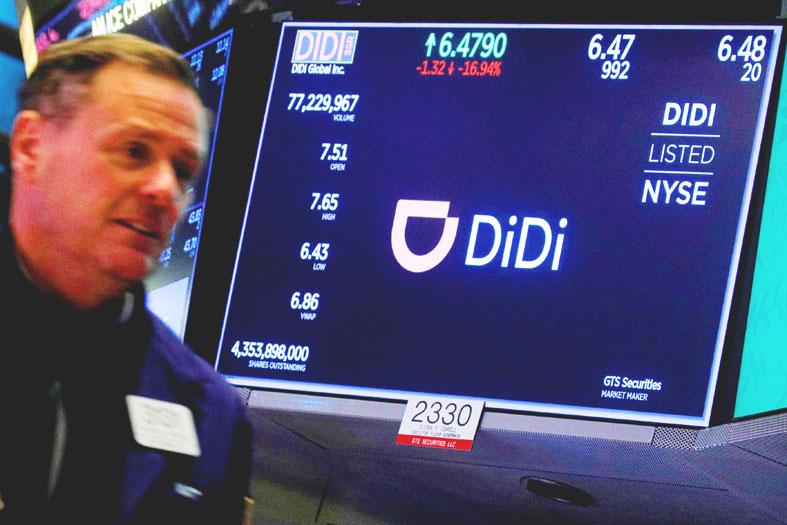Chinese ride-hailing giant Didi Global Inc (滴滴) on Wednesday reported a 1.7 percent decline in third-quarter revenue, as its domestic business took a hit from a regulatory crackdown.
Alibaba Group Holding Ltd (阿里巴巴) chief executive officer Daniel Zhang (張勇) had resigned from his post as director on Didi’s board, the company said.
He is succeeded by Yi Zhang (張毅), a senior legal director at Alibaba Group, it said.

Photo: Reuters
Chinese authorities have come down hard on Didi after its New York Stock Exchange listing in June, demanding that it took down its app from mobile app stores, while the Cyberspace Administration of China investigated its handling of customer data.
The restriction hit Didi, cofounded in 2012 by former Alibaba employee Will Cheng (程維) and backed by Softbank Group Corp, which was the dominant ride-hailing company in China.
The company now faces stiff competition from ride-hailing services by automakers Geely Holding Group (吉利控股) and SAIC Motor Corp Ltd (上海汽車).
Under pressure from Chinese regulators concerned about data security, Didi this month succumbed and decided to delist from the New York Stock Exchange and pursue a Hong Kong listing.
Shares of Didi, which soared on their initial public offering, giving the company a valuation of US$80 billion and marking the biggest US listing by a Chinese firm since 2014, have since declined 65 percent.
Didi on Wednesday said that its board had authorized it to pursue a listing of its class A ordinary shares on the main board of the Hong Kong Stock Exchange.
“The company is executing above plans and will update investors in due course,” Didi said.
Revenue for the third quarter fell to 42.7 billion yuan (US$6.7 billion) from 43.4 billion yuan a year earlier.
Didi, which is expanding its presence in Europe and South America, said that revenue from its international operations nearly doubled to 966 million yuan in the quarter. Net loss attributable to ordinary shareholders was 25.91 yuan.

SEEKING CLARITY: Washington should not adopt measures that create uncertainties for ‘existing semiconductor investments,’ TSMC said referring to its US$165 billion in the US Taiwan Semiconductor Manufacturing Co (TSMC, 台積電) told the US that any future tariffs on Taiwanese semiconductors could reduce demand for chips and derail its pledge to increase its investment in Arizona. “New import restrictions could jeopardize current US leadership in the competitive technology industry and create uncertainties for many committed semiconductor capital projects in the US, including TSMC Arizona’s significant investment plan in Phoenix,” the chipmaker wrote in a letter to the US Department of Commerce. TSMC issued the warning in response to a solicitation for comments by the department on a possible tariff on semiconductor imports by US President Donald Trump’s

The government has launched a three-pronged strategy to attract local and international talent, aiming to position Taiwan as a new global hub following Nvidia Corp’s announcement that it has chosen Taipei as the site of its Taiwan headquarters. Nvidia cofounder and CEO Jensen Huang (黃仁勳) on Monday last week announced during his keynote speech at the Computex trade show in Taipei that the Nvidia Constellation, the company’s planned Taiwan headquarters, would be located in the Beitou-Shilin Technology Park (北投士林科技園區) in Taipei. Huang’s decision to establish a base in Taiwan is “primarily due to Taiwan’s talent pool and its strength in the semiconductor

An earnings report from semiconductor giant and artificial intelligence (AI) bellwether Nvidia Corp takes center stage for Wall Street this week, as stocks hit a speed bump of worries over US federal deficits driving up Treasury yields. US equities pulled back last week after a torrid rally, as investors turned their attention to tax and spending legislation poised to swell the US government’s US$36 trillion in debt. Long-dated US Treasury yields rose amid the fiscal worries, with the 30-year yield topping 5 percent and hitting its highest level since late 2023. Stocks were dealt another blow on Friday when US President Donald

UNCERTAINTY: Investors remain worried that trade negotiations with Washington could go poorly, given Trump’s inconsistency on tariffs in his second term, experts said The consumer confidence index this month fell for a ninth consecutive month to its lowest level in 13 months, as global trade uncertainties and tariff risks cloud Taiwan’s economic outlook, a survey released yesterday by National Central University found. The biggest decline came from the timing for stock investments, which plunged 11.82 points to 26.82, underscoring bleak investor confidence, it said. “Although the TAIEX reclaimed the 21,000-point mark after the US and China agreed to bury the hatchet for 90 days, investors remain worried that the situation would turn sour later,” said Dachrahn Wu (吳大任), director of the university’s Research Center for